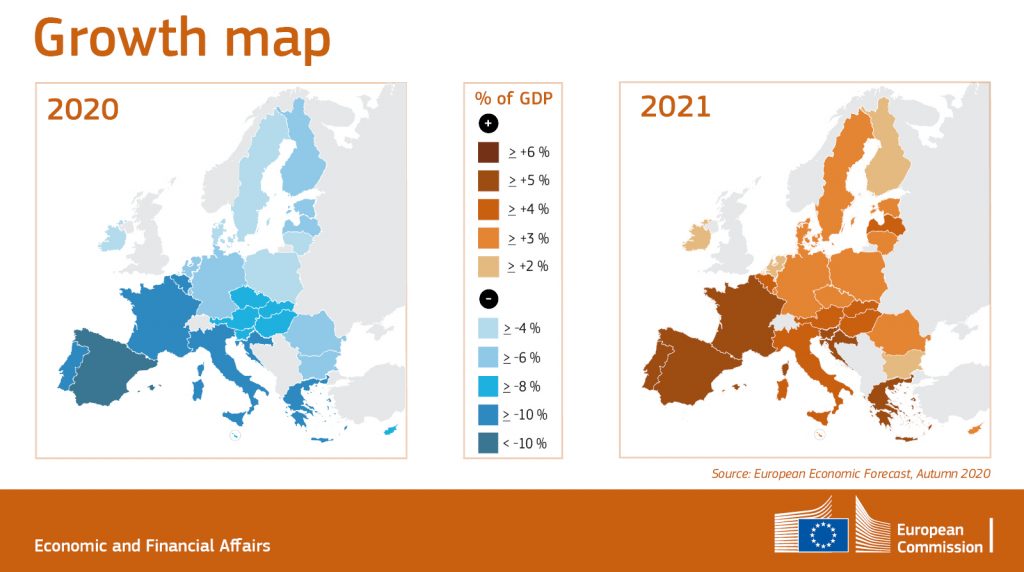
The European Commission announced in May 2020, através de Ursula Von der Leyen, chairman of the commission, an economic aid package that intends to issue market bonds with the aim of forming an economic recovery fund for the 27 member countries, who suffered and are still suffering the consequences of the crisis caused by the new Coronavirus pandemic. The package will consist of donations and loans to all EU Member States. It is worth mentioning that, com a crise do Sars-Cov-2, the countries started to look at each other in a more consensual and collective way., what did not happen in previous situations.
The leaders of the 27 Member States met during 5 days (17 – 21 jul) in Brussels to discuss the agreement and its main points. The total value of the package is over € 1,8 trillion, equivalent to R $11,4 trillions, or the Brazilian GDP in 2019 multiplied by 1,6, which means a high monetary value destined to economic aid to member countries of the European Union. It is estimated that the bloc's economy will suffer a retraction of 8,3%.
Some points during the negotiations raised agendas and obstacles that were discussed, for example, a point that caused obstacles in the negotiations were the € 750 billions earmarked for grants and loans. This is the 1st time that the European Union will issue joint debt securities to capture the fund's value on the market. the € 750 billions will be allocated to countries to mitigate the effects of the pandemic and seek to propose an economic restructuring of the countries in question.
Countries like Holland, Denmark, Sweden and Austria, with the support of Finland, were against the idea that half should be given as non-refundable funds to countries that, according to them, do not enjoy economic rigidity, like Italy and Spain, which were the European countries most affected by covid-19 and are being affected by the paralysis of their economies. In contrast, France and Germany, initially planned to destine 500 billion euros for subsidies. After many discussions and negotiations, the head of the European Council, Charles Michel, prepared a proposal that was accepted by the leaders of the bloc, will be 390 billions of euros in non-repayment and 360 billions of euros granted in loans with lower interest rates than those practiced in the international market. It has been established that, countries that apply for loans will have 30 years to pay the credit, starting to count the deadline in 2028.
The Italy, the hardest hit by the pandemic, will receive 209 billions of euros. The Italian government will have to present its reform project and will have to fulfill the obligations that were established as a requirement for receiving the money. former prime minister, Giuseppe Conte, managed to overturn the objections of the Dutch-led group, who advocated more limited aid.
Spain must receive 140 billions of euros, which generated gratitude from the Spanish government, who stated that this would serve as a good basis for future negotiations with the bloc and other countries..
Greece should receive 72 billions of euros and promised that the funds will be used with caution, organization and planning. the prime minister, Kyriakos Mitsotakis stated that there is no intention to waste the money and that the amount will be invested for the benefit of all Greeks.
Hungary and Poland are concerned that the agreement makes receiving aid conditional on respect for the rule of law., since both are targets of investigation by the European Commission for alleged violations of democratic principles.
Franco-German cooperation was crucial for the development of the agreement.. Emmanuel Macron, president of france, and Angela Merkel, german chancellor, spoke together to the press. Macron thanked Germany for cooperation, a Ursula Von der Leyen, for your commitment and to Charles Michel, President of the European Commission.
Soon after the decision and approval of all 27 countries, european council president Charles Michel tweeted the message “agreement!”, which for him means a strong agreement that demonstrates that Europe is solid and united during this crucial moment in which not only Europe, but the world lives. In addition to Charles Michel, the german chancellor, Angela Merkel was happy and relieved with the decision made., she said that "it wasn't easy", but that they have reached an important agreement aimed at the common good of the European Union.
During this time so difficult that the world lives, the European bloc knew how to manage and bring good results in the face of the pandemic. Since a large part of European countries have been drastically impacted by the consequences of Coronavirus, sought, come in if, this agreement that aims at the well-being and economic recovery of countries belonging to the European Union, even with some obstacles and disapproval, the countries placed themselves on the same side, which demonstrates cooperation and solidarity, aiming at the well-being of everyone belonging to the block.
By Francesca Abduch Tognoli and Giovanna Bruno
